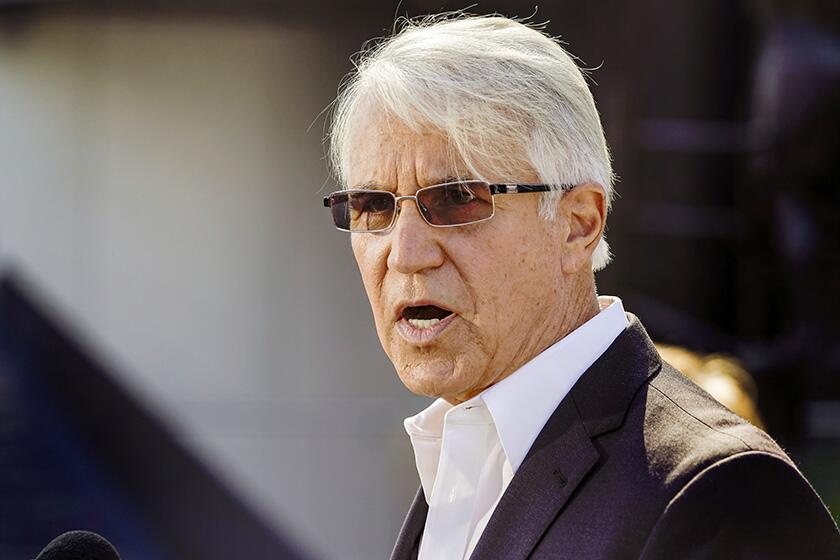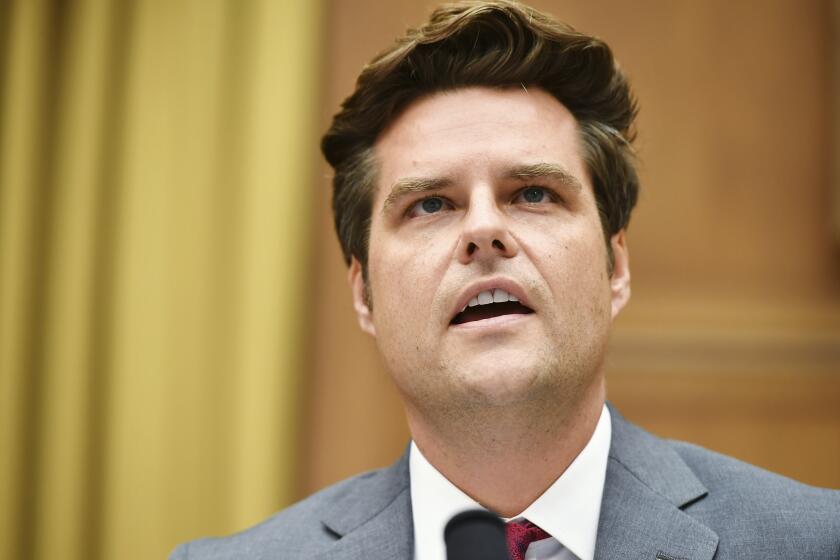Paul Rusesabagina, Rwanda’s hotel hero
Most bio-pics are made about somebodies — warriors, kings, artists. This was a bio-pic about a nobody who became a somebody during the Rwandan genocide, a bloody crossroads for a country with deep-seated ethnic frictions. In April 1994, Paul Rusesabagina was brevetted as general manager of the luxury hotel where he worked, and where more than 1,000 people had fled from the killing rampage. For more than two months, he managed to protect them from being slaughtered. Ten years later, the world saw “Hotel Rwanda.” Today, there is no love lost between Rwandan President Paul Kagame and Rusesabagina, who lives in San Antonio and travels to lecture about human rights, as he did in Los Angeles not long ago.
Is there such a thing as a post-ethnic society? The government in Rwanda wants everyone to be not Hutu or Tutsi but Rwandan.
The problem with today’s Rwandan government is trying to say that ethnicities do not exist. That is maybe because we fear what we did ourselves, [now] we want to say all of us are Rwandans. We have a group of [mostly Tutsi] elite who are taking power because they [proclaim that they are] Rwandans.
Whenever they talk about ethnicity, they always talk [of] Hutus who kill Tutsis — bad guys who kill good guys. They position themselves as victims and others as perpetrators. They say whatever they think will solve their problem for that minute. When they become victims, they become Tutsis. When they are not victims and they are in power, they are Rwandans.
Didn’t European colonists codify these distinctions with ID cards?
Yes and no. Go to the meaning of the words. “Tutsi” means “the elite, one who is better, who has wealth.” Wealth before colonization was measured in cows. “Hutu” means “follower, a servant, a slave.” These words were created by us, not by colonizers.
But then isn’t it a good idea to get rid of names that reinforce distinctions?
Anything can be good, but the way they are doing it is the wrong way. [For example,] in 2008 someone decided overnight that Rwanda should become an English-speaking country. Anything which is forced always becomes a bad thing.
What do you miss most about Rwanda?
I miss everything! The hill where I used to sit in the afternoon every rainy day, and when the whole sky would break clear and I would see maybe 100 miles. I miss the place where I was born and raised.
Have you been back since you left in 1996?
I went back in 2004 before the movie came out. I sensed what was going to happen: the hatred from the Rwandan president seeing a Hutu becoming a hero, where he had positioned himself with his people as heroes. So we took our three younger kids there so they would know where they came from.
What do you think of efforts to discredit you, such as protesters showing up when you speak?
I like it. This shows the weakness of [the Rwandan] government. I can never imagine a president who is supposed to be busy [with] politics running after me, a small citizen. The president is making me more important than I am supposed to be.
Do you worry that you are still a target?
If I were to worry, I wouldn’t do anything. I would just lock myself in my house. So if anyone wants to kill me, I think that will be that person’s problem, not mine. In 1994, this helped me to go on. I was targeted because I was protecting the most wanted people. The elite intellectuals were in my hotel. The business elite, also ordinary and common human beings were there. I said to myself, “Oh well, I will be killed; shall I give up? No. let me do one more small thing before I die.” I kept on going like that. Since that time, every day, every month, every year, I call it a bonus.
What do you think of the United Nations’ role in Rwanda then?
I was disappointed on many occasions. When the United Nations came to Rwanda in October 1993, we were sensing something. We were smelling death. The whole country was nervous and tense. When the United Nations sent in forces, we called them peacekeepers. Their mission was not to keep peace. Their mission was to observe. As weak as they were, when we saw the United Nations pulling out of Rwanda, abandoning our nation to thugs and gangsters and running away, all of us were caught. So I was disappointed at that time by the United Nations.
How do you regard American misperceptions of Africa?
There have been reasons why Americans do not really think about Africa. One reason is that Africa is far from America. The American continent is more or less self-sufficient. But since 9/11, Americans would like to know what is happening elsewhere. The opinion is changing, and we want to be part of the change.¿
You’ve been speaking at places like Harvard-Westlake School. Why those audiences?
This is my mission, telling tomorrow’s leaders that you guys are rich, you are safe, but there are many kids [who] do not have that chance in a country called Rwanda. These kids will only be saved by you. All those kids worth talking to today are tomorrow’s congressmen and women, tomorrow’s secretaries of state, tomorrow’s presidents.
Some in the West point to Rwanda now as a model, with decent schools, electricity, clean streets.
In 2011, in Rwanda, [U.N. Ambassador] Susan Rice was taken to the genocide memorials. They showed her the new [office] towers they had built, and I loved her statement. [Rice praised Rwanda’s educational, economic and agricultural advancements.] She [also] told them, “Listen, as long as there is no democracy in this country, as long as human rights records remain as they are, as long as there is no freedom of speech, all these achievements will be like a castle made of paper.”
Are you worried Rwanda could turn on itself again?
Unfortunately, history repeats itself, and we never learn lessons. As long as you have so many people silenced, so many people outside the country as refugees, you are sitting ducks. As long as you [deny] people the opportunity to talk together, as long as people can’t criticize — that can never last forever. Rwanda is more or less like a simmering volcano that might erupt at any time.
What could change that?
There are powerful countries that have a lot of influence on President Kagame — the United States, the United Kingdom. If they take their courage and tell him, “You have had your 15 minutes.” Every leader who is there for 10 years, 20 years, will not bring anything new to his people besides reinforcing dictatorship.
The best way to solve this conflict is through words. We have tried for 60 years and more to solve our conflicts through guns. It is clear that guns have failed, so why don’t we sit around the table, face to face, bring whole truths to that table. Who did what? The people know; they witnessed everything. Give them an opportunity to express themselves freely. This is the only way that justice can be practiced and that sustainable peace can come to Rwanda and the whole region.
If you could ask President Obama to do something for the 20th anniversary of the genocide, what would it be?
I would ask him to tell Rwandans and the whole world that it is high time that people should sit down together and solve conflicts.
What’s the path to justice and reconciliation?
The way the Rwandan government has done it is very weak and biased. It has been politicized; it is not clean.
In the beginning, Rwandans were willing to cooperate and tell who did what. But when they saw the government just taking all the Hutus into prison, killing them, innocents and criminals, they decided to remain silent. The Rwandan government wants people to say, “OK, I did it,” even if they’re not criminals. President Kagame said all Hutus, even those who were not born in 1994, will have to pay a price to Tutsis.
What do you mean when you say the Rwandan government is selling genocide like a product?
The Rwandan government has confused politics and genocide. With the international community, they always play the genocide card: Everybody should apologize to them [for not intervening]. You saw Bill Clinton, Tony Blair: “We are sorry, we are sorry.” Whoever tries to raise a voice is silenced by this word “genocide.” The Rwandan Patriotic Front [the current ruling party] killed many Hutus before the war. “Genocide” is losing its value because they are playing around with it. It is a pity.
I lost many members of my immediate family [including his Tutsi wife’s mother and siblings, nieces and nephews]. It is our legacy; seeing someone selling it, it makes us mad.
Your mother was Tutsi, your father Hutu. What does that make you?
I was born to a mixed couple, but in Rwanda, we follow our fathers. I am very proud to be what my father was. And my father was a gentleman.
This interview was edited and excerpted from a taped transcript. [email protected]. Twitter:@pattmlatimes
More to Read
A cure for the common opinion
Get thought-provoking perspectives with our weekly newsletter.
You may occasionally receive promotional content from the Los Angeles Times.











